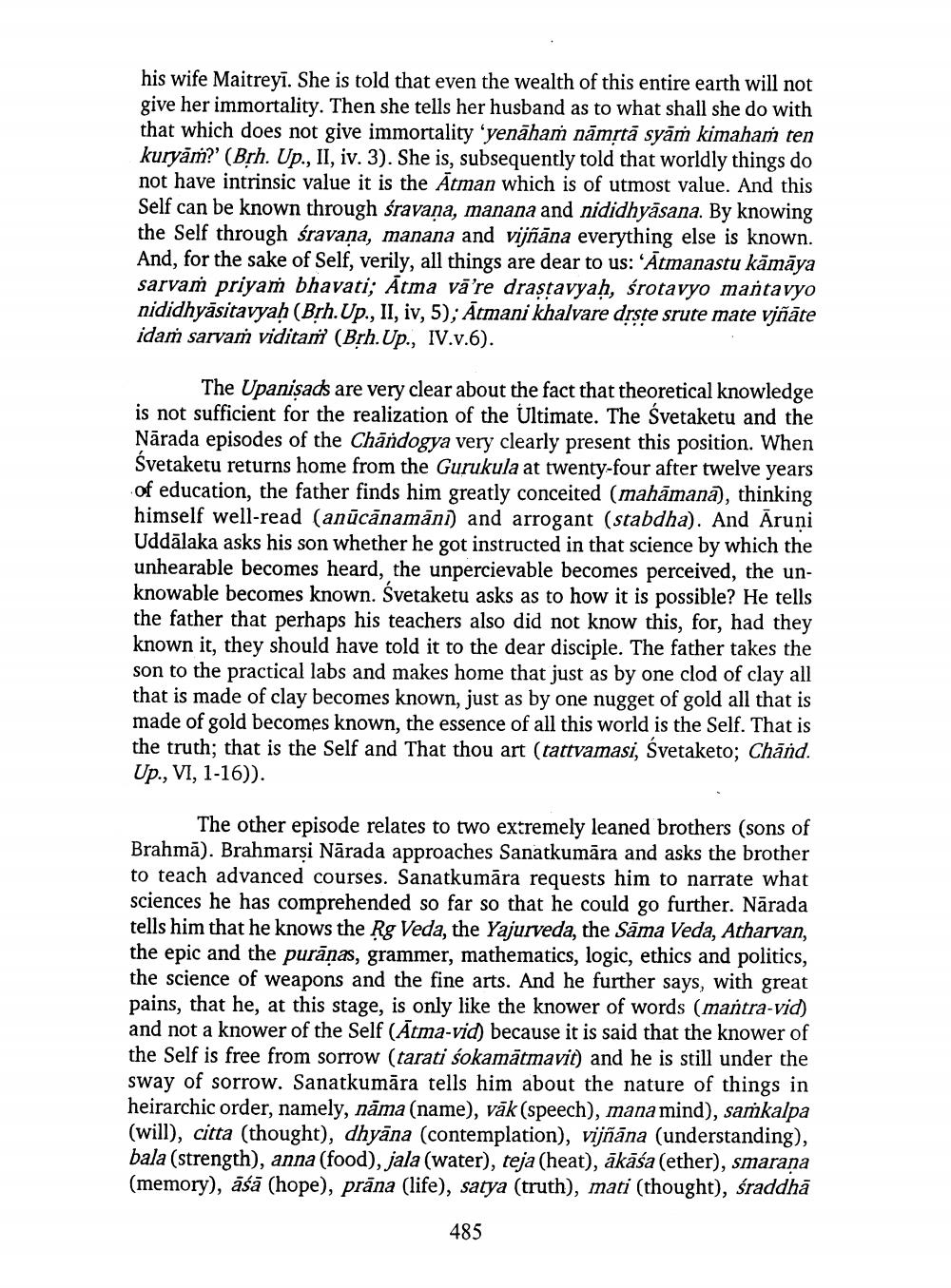________________
his wife Maitreyi. She is told that even the wealth of this entire earth will not give her immortality. Then she tells her husband as to what shall she do with that which does not give immortality 'yenāham nāmrtā syāṁ kimahań ten kuryām?' (Brh. Up., II, iv. 3). She is, subsequently told that worldly things do not have intrinsic value it is the Atman which is of utmost value. And this Self can be known through śravana, manana and nididhyasana. By knowing the Self through śravana, manana and vijñāna everything else is known. And, for the sake of Self, verily, all things are dear to us: 'Atmanastu kāmāya sarvaṁ priyam bhavati; Atma vā're drastavyah, śrotavyo matavyo nididhyasitavyah (Brh.Up., II, iv, 5); Atmani khalvare drste srute mate vjñāte idaṁ sarvaṁ viditam (Brh.Up., IV.v.6).
The Upanisads are very clear about the fact that theoretical knowledge is not sufficient for the realization of the Ultimate. The Svetaketu and the Nārada episodes of the Chándogya very clearly present this position. When Svetaketu returns home from the Gurukula at twenty-four after twelve years of education, the father finds him greatly conceited (mahamana), thinking himself well-read (anūcānamāni) and arrogant (stabdha). And Aruni Uddālaka asks his son whether he got instructed in that science by which the unhearable becomes heard, the unpercievable becomes perceived, the unknowable becomes known. Svetaketu asks as to how it is possible? He tells the father that perhaps his teachers also did not know this, for, had they known it, they should have told it to the dear disciple. The father takes the son to the practical labs and makes home that just as by one clod of clay all that is made of clay becomes known, just as by one nugget of gold all that is made of gold becomes known, the essence of all this world is the Self. That is the truth; that is the Self and That thou art (tattvamasi, Svetaketo; Chand. Up., VI, 1-16)).
The other episode relates to two extremely leaned brothers (sons of Brahmā). Brahmarsi Nārada approaches Sanatkumāra and asks the brother to teach advanced courses. Sanatkumāra requests him to narrate what sciences he has comprehended so far so that he could go further. Närada tells him that he knows the Rg Veda, the Yajurveda, the Sama Veda, Atharvan, the epic and the purānas, grammer, mathematics, logic, ethics and politics, the science of weapons and the fine arts. And he further says, with great pains, that he, at this stage, is only like the knower of words (mantra-vid) and not a knower of the Self (Ātma-vid, because it is said that the knower of the Self is free from sorrow (tarati sokamātmavit) and he is still under the sway of sorrow. Sanatkumāra tells him about the nature of things in heirarchic order, namely, nāma (name), vāk (speech), mana mind), saskalpa (will), citta (thought), dhyāna (contemplation), vijñāna (understanding), bala (strength), anna (food), jala (water), teja (heat), ākāśa (ether), smarana (memory), aśā (hope), prāna (life), satya (truth), mati (thought), sraddhā
485




